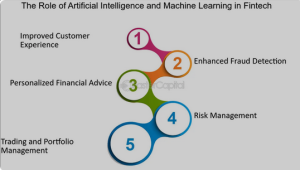Artificial Intelligence (AI) and Machine Learning (ML) play a pivotal role in shaping business strategies across various industries. These technologies have the potential to transform the way businesses operate, make decisions, and interact with customers. The purpose of this research is to break down Artificial Intelligence (AI) and machine learning In shaping business strategies.

Artificial Intelligence (AI) And Machine Learning In Shaping Business Strategies
-
Table of Contents
ToggleData-driven Decision Making:
- AI and ML enable businesses to analyze vast amounts of data quickly and efficiently. This data-driven approach helps in making informed decisions based on patterns, trends, and insights derived from the data.
-
Predictive Analytics:
- Machine learning algorithms can be employed for predictive analytics, forecasting future trends and behaviors based on historical data. This capability is particularly useful in inventory management, demand forecasting, and financial planning.
-
Customer Insights and Personalization:
- AI and ML are utilized to analyze customer behavior and preferences. Businesses can use this information to create personalized marketing strategies, recommend products or services, and enhance overall customer experience.
-
Automation and Efficiency:
- AI and ML technologies automate repetitive and time-consuming tasks, improving operational efficiency. This allows employees to focus on more strategic and creative aspects of their work, leading to increased productivity.
-
Fraud Detection and Security:
- Machine learning algorithms can identify patterns indicative of fraudulent activities. In the financial industry, for example, AI helps detect unusual transactions and prevent fraudulent transactions in real-time.
-
Supply Chain Optimization:
- AI and ML are used to optimize supply chain processes, from procurement and production to distribution and logistics. Predictive analytics can improve inventory management, reduce costs, and enhance overall supply chain efficiency.
-
Human Resources and Talent Management:
- AI facilitates the recruitment process by automating resume screening, identifying suitable candidates, and predicting employee performance. It can also assist in talent management by providing insights into employee engagement and retention.
-
Competitive Intelligence:
- AI tools can analyze competitors’ strategies, market trends, and consumer sentiment, providing businesses with valuable insights for competitive intelligence. This information can inform strategic planning and help organizations stay ahead in the market.
-
Product and Service Innovation:
- AI and ML contribute to innovation by identifying market gaps, predicting consumer needs, and assisting in the development of new products and services. This fosters a culture of continuous innovation within organizations.
-
Risk Management:
- AI helps businesses assess and mitigate risks by analyzing data for potential vulnerabilities and threats. This is particularly important in industries such as finance, where managing risks is a critical aspect of operations.
In conclusion, the integration of AI and ML into business strategies is becoming increasingly essential for organizations seeking to stay competitive and agile in today’s rapidly evolving landscape. These technologies not only provide valuable insights but also offer automation and efficiency gains that can significantly impact a company’s bottom line and overall success.
